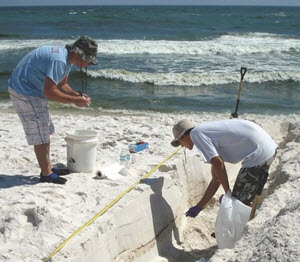
Jonathan Delgardio and Will A. Overholt (Georgia Institute of Technology) collect samples from a Pensacola Beach sand trench with oil layers. (Photo by Markus Huettel)
Genomics is a powerful method to track things that humans cannot see. Months and years after the Deepwater Horizon oil spill, many people wondered where the oil went or where it might be lingering or what it may affect after it was no longer visible. Scientists are using genomic techniques such as DNA sequencing to help answer some of these questions.
The Smithsonian posted an article featuring scientists Joel Kostka, Jack Gilbert, and David Portnoy. Kostka’s work focuses on using genetic markers of microbes to determine whether or not shorelines have been affected by the oil spill. Gilbert’s work focused on identifying microbes who feed on carbon as a way to determine if oil is being degraded in environments such as sediment. Portnoy’s work focuses on detecting possible long-term impacts on fish that live in waters exposed to the oil spill.
Read the Ocean Portal article to learn how genomics help us understand oil spill impacts.
For more information about oil spill research that employs genomics, read:
- Study: Early-Responder Microbial Groups Differed Over Time in Oiled Beach Sands
- Study Extends Precise Analysis of Oxygenated Products in Weathered Oil
- Grad Student Shin Shines Light on Oil-Degrading Microbes in Sediment
- Research on Oil Transport that Informs Spill Response
- Research on Oil Biodegradation and Monitoring that Informs Spill Response
- Ocean Science Made Easy – Corals, Sharks, Microbes, and More!
************
GoMRI and the Smithsonian have a partnership to enhance oil spill science content on the Ocean Portal website.
The Gulf of Mexico Research Initiative (GoMRI) is a 10-year independent research program established to study the effect, and the potential associated impact, of hydrocarbon releases on the environment and public health, as well as to develop improved spill mitigation, oil detection, characterization and remediation technologies. An independent and academic 20-member Research Board makes the funding and research direction decisions to ensure the intellectual quality, effectiveness and academic independence of the GoMRI research. All research data, findings and publications will be made publicly available. The program was established through a $500 million financial commitment from BP. For more information, visit http://gulfresearchinitiative.org/.
